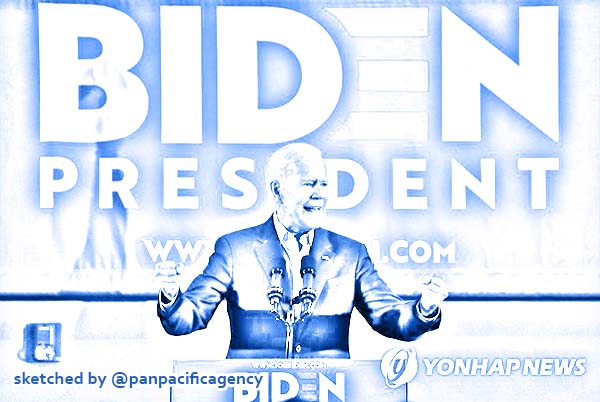Japan hopes RCEP deal pushes Biden and US to rejoin trade frameworks

This AP photo shows former U.S. Vice Presient Joe Biden delivering a campaign speech on May 7. (Yonhap). Sketched by the Pan Pacific Agency.
TOKYO, Nov 16, 2020, Kyodo. The long-awaited free trade agreement signed Sunday between 15 Asia-Pacific countries after eight years of talks reflect their determination to strengthen economic unity and promote free trade, regardless of political differences, as questions loom over how U.S. President-elect Joe Biden will engage with the region, The Japan Times reported.
Japan hopes the Regional Comprehensive Economic Partnership, which includes China and South Korea and represents 30% of the world’s trade and population, will encourage the United States to return to a multilateral trade framework.
“Regarding RCEP, it may create discussions in the United States, such as ‘is it okay that we are sitting out when a free trade network is created in the Indo-Pacific?'” a senior Japanese diplomat said.
The Trans-Pacific Partnership had been promoted by the administration of U.S. President Barack Obama, under which Biden served as vice president. But incumbent President Donald Trump withdrew the United States from talks shortly after taking office in 2017, saying he preferred to negotiate deals bilaterally under the “America First” mantra.
“The RCEP agreement creates a momentum of free trade and puts out the message that the world is returning to globalization, away from the protectionism pushed by Trump,” said Keisuke Hanyuda, CEO of Owls Consulting Group Inc., a former Japanese trade ministry official involved in free trade negotiations.
“As economic integration in Asia involving China progresses under RCEP, it can motivate and add pressure to Biden into thinking that the United States needs to return to the TPP,” said Hanyuda, although Washington’s return to the framework is difficult as it requires the support of both Republicans and Democrats.
Japanese officials also hope that the United Kingdom’s enthusiasm in joining the TPP may raise its attractiveness for the next Biden administration, which is thought to be keen on cooperating with allies to pressure China.
Before the U.S. exit, the 12-party TPP represented 40% of the global economy and boasted sharply higher trade and investment standards than RCEP. It had strategic significance in countering China, which has increased its influence in the Asia-Pacific via its Belt and Road Initiative.
Japan led efforts to rescue the TPP, striking an agreement with the remaining 10 countries, including Australia and Canada, and implementing the revised deal, officially known as the Comprehensive and Progressive Agreement for Trans-Pacific Partnership, in 2018.
“Regarding the trade policy of the next U.S. administration, it is hard to predict how it will be. But with the United States the world’s No. 1 in GDP and its economy globalizing, I believe it is a country that can meet the TPP’s high-standard rules,” Foreign Minister Toshimitsu Motegi told a Diet committee on Friday.
“Japan thinks it is extremely important that countries like the United States join the TPP and further expand the momentum of free trade and make common rules fit for the 21st century,” he said. “In this regard, Japan will continue to exchange views and communicate with the United States.”